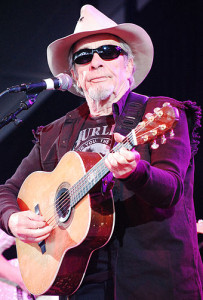Perhaps I would be a bit remiss by not mentioning the passing of a great American songster: Merle Haggard.
The country music legend died April 6, 2016, his birthday, at his home in the San Joaquin Valley of California. His wife, Theresa, said on the singer’s official website that Haggard had long suffered various health problems.
Growing up where I did, in the East Texas Pineywoods — just across the Sabine River from Louisiana, it was pretty hard to avoid country music. That and Swamp Pop, a combination of Cajun music, and rhythm and blues. The older I got the more I enjoyed rock and roll, in a progressive fashion. First, it was the Monkees, later came more substantial rock and soon I was listening to Black Sabbath, the former thanks to my departed buddy, Waldo. My musical tastes ran wild and still continue to do so. I like many of the older rockers like Chuck Berry, as well as the blues as performed like the masters, ranging from Bobby “Blue” Bland to B.B. King. But I never really got away from “both kinds of music — country AND western,” as the bar owner told Jake and Elwood in “The Blues Brothers.”
Some periods of country music were worst than most. Some of the Nashville music big shots wanted to take the country and western out of the country and western. But there were some noble souls who wouldn’t ride that train, the so-called “outlaws” like Willie Nelson, Waylon Jennings, Jerry Jeff Walker, Billy Joe Shaver, and Kris Kristofferson. Many of this bunch decided Austin would be a much more compatible location for the type of music they wanted to do.
But through it all, Merle Haggard traveled onward dodging most of the bastardized C & W hits, through the last of the century and on into the new one. In later years he seemed to be as mellow an outlaw as his compatriots such as Willie did. Although, Haggard remained true to his music and what he felt about life, love, heartbreak, hard time as well as hard times.

It would be hard to rate my favorite songs by The Hag. That would be like asking who is my favorite family member? I love his prisons songs: “Sing Me Back Home,” “Branded Man” as well as his tributes that proceeded to Jimmie Rodgers and later, Bob Wills. A couple of my favorite were “Rainbow Stew” and “Big City.”
I suppose an example of my love of The Hag’s music is back in high school when I was a just a long-haired kid . My late brother John asked me if I would go with him to the nursing home and play for the patients. I must have been smoking something or other because I hadn’t sung in front of people since grammar school and I don’t think I have sung solo, in public, since.
John was a pretty good piano player who performed with some local boys in high school. This was probably when I was maybe six or seven years old. He continued to play, though not so much for the public. His first wife Wendy, a great gal I would have done anything for, was the recreation director for the home. I can’t remember if he and Wendy were divorced or separated by then, it doesn’t really matter. The home needed some entertainment so it looked like John at the piano, this young black gospel guitarist and myself, vocalist, were it.
About the only songs I knew I could sing with anything near accuracy was Merle Haggard songs. I will say this, John did a heck of a job playing even when he wasn’t particularly familiar with the song. And the young guitarist followed along on every song that, with his gospel background, gave our odd group a bluesy sound,
The old folks loved it. Of course, if I had been in their shoes I’d have probably liked anything. At least no one told me to quit my day job — which was high school.
Lots of memories have flooded over during these last two days while thinking about Merle’s songs. I never saw him play, but as a master musician, he was the genuine article. And, he left us with a long, rich legacy to enjoy.
